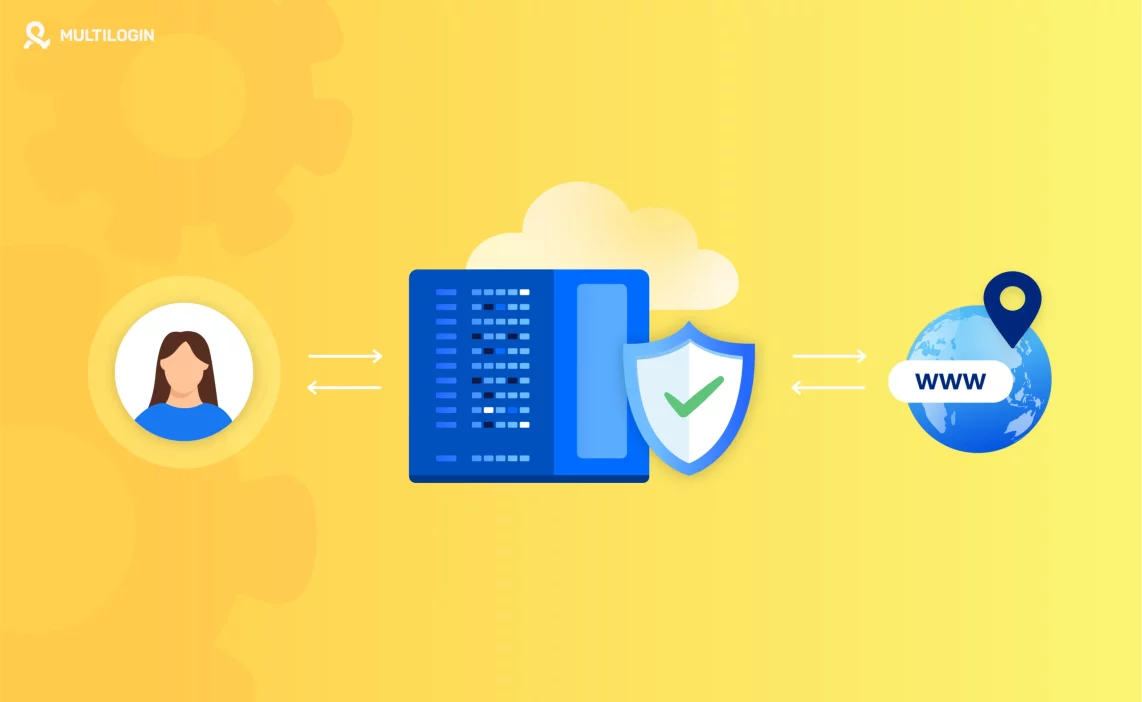If you’ve ever heard the term proxy server and wondered what it actually means, you’re not alone!
In the digital world, proxies play a significant role in enhancing privacy, security, and internet performance. But what exactly is a proxy server, how does it work, and why should you use one?
In this guide, we’ll break down the basics of proxy servers, explain what they do, and cover the different types of proxies and their uses.
Whether you’re concerned about privacy or want to access content from a different region, understanding proxies is the first step toward managing your internet experience.
Tired of Proxy Problems? Upgrade to Multilogin Now for Superior Proxy Management.
What is a Proxy Server?
A proxy server is an intermediary server that sits between your device (like a computer or smartphone) and the internet. When you use a proxy, your device sends requests to the proxy server instead of directly to the website or service you’re trying to access. The proxy server then makes the request on your behalf, retrieves the data, and sends it back to your device.
In essence, a proxy server acts as a gateway that forwards internet traffic between you and the services you want to access. This helps hide your real IP address, giving you more control over your online privacy.
What Does a Proxy Server Do?
A proxy server serves several important functions, depending on the type of proxy and its specific use case. Here’s what a proxy typically does:
- Hides Your IP Address: When you connect to the internet via a proxy, the websites you visit see the proxy server’s IP address rather than your own. This adds a layer of anonymity and can help protect your identity online.
- Improves Security: Proxy servers act as a barrier between your device and the internet, which can help block malware, viruses, and other online threats. Some proxies even scan the traffic for malicious content before it reaches your device.
- Content Filtering: Organizations often use proxies to filter web content, blocking access to certain websites or services. For example, a company might block social media sites, or a school might restrict access to entertainment websites during class hours.
- Bypass Geographic Restrictions: Some websites or services restrict access based on your geographical location. Using a proxy server can make it appear as though you’re browsing from a different region, enabling you to access region-locked content.
- Cache Data for Faster Access: Some proxy servers cache (store) copies of web pages. If you or others request the same page again, the proxy can serve the cached version, speeding up load times and reducing bandwidth usage.
What Are Proxies?
In the broader sense, proxies refer to any intermediary server that processes requests on behalf of the original client. They can be used for a variety of purposes, such as hiding your identity, bypassing firewalls, or accessing restricted content.
Types of Proxies
There are several types of proxies, each designed to fulfill different roles:
- HTTP Proxy: This type of proxy only handles HTTP traffic, which is used for browsing the web. It’s great for simple tasks like accessing websites while hiding your IP address.
- HTTPS Proxy: This is a secure version of the HTTP proxy, encrypting the data between you and the proxy server. It’s ideal for situations where you need secure browsing, such as logging into a website that requires a password.
- SOCKS Proxy: A more versatile proxy that works for all types of internet traffic (including email, video, and torrents). SOCKS5, the latest version, supports additional features like authentication and encryption.
- Residential Proxy: This type of proxy uses IP addresses that belong to real devices in residential areas. Residential proxies are harder for websites to detect because they look like regular home users browsing the internet.
- Data Center Proxy: These proxies come from data centers, not real residential locations. They’re faster and cheaper than residential proxies, but they’re more easily detectable.
What is a Proxy Service?
A proxy service is a company or service provider that offers access to proxy servers. Instead of setting up your own proxy server, you can purchase access to a shared or dedicated proxy through a proxy service.
Why Use a Proxy Service?
Proxy services are popular because they simplify the process of setting up and using proxies. Instead of managing the technical details, you can rent a proxy and immediately start using it for tasks like web scraping, SEO analysis, or bypassing geo-restrictions.
Stats: The proxy service market has grown substantially, with estimates showing a market size of $5.2 billion in 2020 and projected growth at a 12.7% CAGR (Compound Annual Growth Rate) over the next five years.
Why Should You Use a Proxy Server?
Still wondering why you need a proxy server? Here are the top reasons to use one:
1. Increase Privacy and Anonymity
A proxy server masks your IP address, providing greater privacy when browsing the internet. This is especially useful if you’re concerned about tracking or want to keep your online activities anonymous.
2. Enhance Security
Proxies can provide an additional layer of security by filtering malicious content, blocking threats, and acting as a barrier between your device and the internet.
3. Access Geo-Restricted Content
Using a proxy can allow you to bypass geo-blocks. Want to watch your favorite TV shows from a different country? Use a proxy to make it appear as though you’re accessing content from that region.
4. Bypass Network Restrictions
If you’re on a restricted network (like at school or work), proxies can help you bypass firewalls and access blocked websites.
5. Optimize Web Scraping and Automation
For businesses that need to scrape data from websites (like competitors’ pricing), proxies help avoid detection and prevent IP bans, allowing you to gather large amounts of data from multiple sources without getting blocked.
Frequently Asked Questions About Proxy Servers
What is a proxy server?
A proxy server is an intermediary that routes your internet traffic to websites or services. It hides your IP address, provides security, and can be used to bypass restrictions or cache data for faster access.
What is a proxy service?
A proxy service is a service provider that gives you access to proxy servers, allowing you to use their proxies for tasks like web scraping, SEO monitoring, or browsing anonymously.
Why should I use a proxy server?
Using a proxy server improves privacy, security, and speed. It helps you remain anonymous, bypass geographic restrictions, and secure your online activities from threats.
What does a proxy server do?
A proxy server forwards internet requests from your device to websites, masking your real IP address, filtering content, and improving security.
What are residential proxies?
Residential proxies use real IP addresses assigned to homes or residences. They are less likely to be flagged by websites because they appear as regular users instead of bots.
Final Thoughts
A proxy server is a powerful tool for managing your online privacy, security, and content access. Whether you’re using it for browsing anonymously, bypassing network restrictions, or managing a web scraping project, proxies provide many benefits that can improve your online experience.
From basic proxies to advanced services like residential and SOCKS proxies, you can find the right solution for your needs.
If you want more privacy and flexibility in your online activities, using a proxy is an excellent way to go. Choose the right proxy service and experience the full potential of secure and private browsing today!




